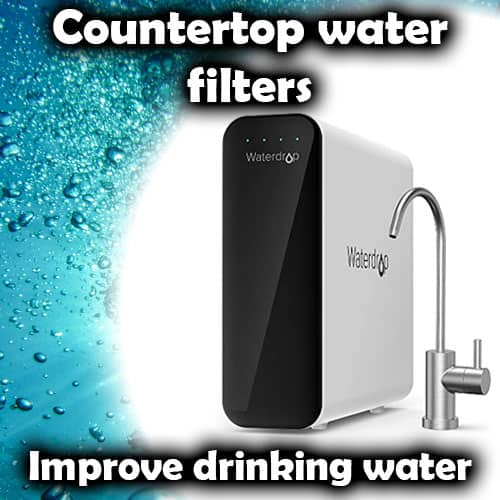Table of Contents
Introduction
Access to clean and safe drinking water is essential for maintaining good health and well-being.
While public water supplies are generally safe to drink, they may contain impurities and contaminants that can affect the taste and safety of the water.
Countertop water filtration systems are a convenient and cost-effective solution for improving the quality of your drinking water.
A countertop water filtration system can remove impurities, such as chlorine, lead, and other contaminants, that may be present in your water supply.
Countertop water filter is easy to install and can be placed on any countertop or kitchen sink, making it a popular choice for households looking to improve the taste and safety of drinking water.
In this blog post, you can find the different types of sink top filters, their benefits, and how to choose the right water filter system for your home and get safe and healthy filtered water.
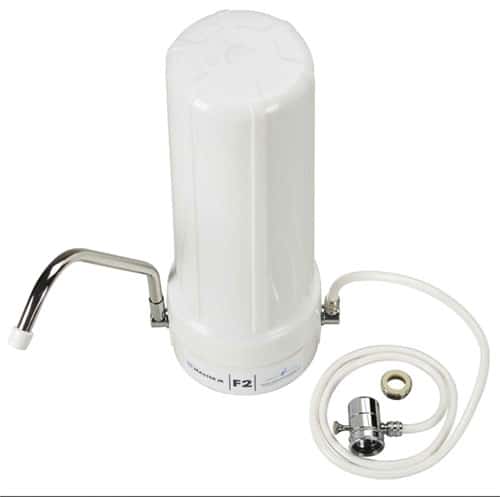
Types of Countertop Drinking Water Filters
There are several types of countertop water filters available on the market, each with their own unique features and benefits.
Some popular types include activated carbon filters, RO filters, UV filters, ceramic filters, and water pitchers.
Activated Carbon Countertop water Filters
Activated carbon countertop water filters are a popular and effective option for purifying tap water.
These filters use activated carbon, a highly porous material that is treated with oxygen to open up millions of tiny pores between the carbon atoms. These pores act as a sponge, attracting and trapping impurities as water flows through the filter.
Activated carbon countertop water filters are available in a variety of models and styles, including countertop pitchers, faucet-mounted filters, and standalone filters. Each model has its own unique features and benefits, so it’s important to choose the one that best fits your needs.
Countertop pitcher filters are a popular option because they are easy to use and take up little space.
These filters typically hold about 7-10 cups of water and have a filter that needs to be replaced every 40-80 gallons of water. They can also remove a wide range of contaminants including chlorine, pesticides, and herbicides providing clean and safe filtered water.
Faucet mounted filters
Faucet-mounted filters, as the name suggests, are attached to the faucet, and do not take up counter space.
These filters are easy to install and can remove a wide range of contaminants such as chlorine, lead, and cysts. They also typically have a filter life of around 100 gallons of water.
Standalone filters
Standalone filters are another option, which are similar to a pitcher filter, but they sit on the countertop and attach to the faucet. These filters are larger and can hold more water, making them a good option for households with multiple users. They also typically have a filter life of around 100 gallons of water.
What can they remove?
Activated carbon filters can remove a wide range of contaminants from water, including chlorine, pesticides, herbicides, volatile organic compounds (VOCs), and trihalomethanes (THMs).
They can also improve the taste and odor of water by removing chlorine and other chemicals.
Activated carbon filters do not remove dissolved minerals, bacteria, viruses, fluoride, heavy metals or radioactive particles, so if you’re looking to remove these contaminants, you may need to consider a different filtration method.
AC filter benefits
One of the main benefits of activated carbon sink top filters is their ability to improve the taste and odor of water.
These filters remove chlorine and other chemicals that can give water an unpleasant taste or smell. They are also relatively affordable and easy to install and maintain, making them a great option to get filtered water for households on a budget.
Another benefit of activated carbon filters is that they are eco-friendly. These filters do not use electricity, and they are made of natural materials. They are also recyclable, and they do not produce any waste.
Activated filters summary
Activated carbon filters are always a convenient and effective option for purifying tap water. They are easy to use, affordable, and remove a wide range of contaminants from water, including chlorine, pesticides, herbicides, volatile organic compounds (VOCs) and trihalomethanes (THMs).
They also improve the taste and odor of water, making it more pleasant to drink. They are eco-friendly and recyclable, which is a great benefit for households who are conscious about their environmental impact.
It’s important to consider which type of filter model is best for your household needs before purchasing an activated carbon countertop filter.
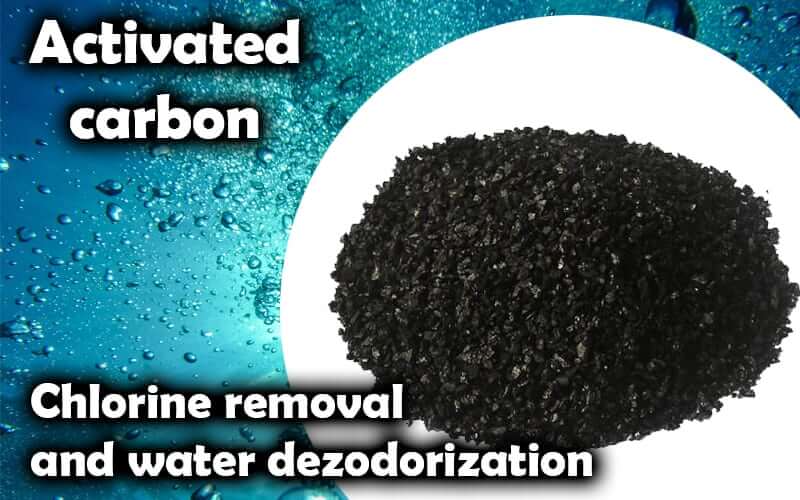
Reverse Osmosis Countertop water filtration system
Reverse osmosis (RO) is a water purification technology that uses a semipermeable membrane to remove dissolved molecules, ions, and larger particles from water. Countertop RO water filtration system is a convenient and affordable way to improve the quality of water by removing impurities such as lead, fluoride, arsenic, and bacteria.
Countertop reverse osmosis water filters
One popular model of countertop water filtration system is the APEC Water Systems RO-CTOP, which uses a four-stage filtration process to remove impurities.
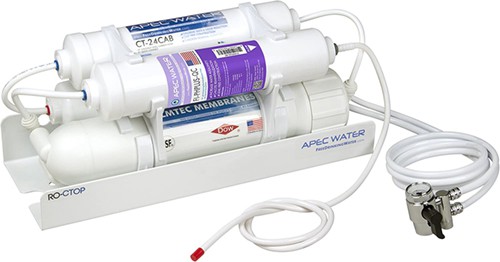
The first stage of this reverse osmosis filter is a sediment filter that removes particles such as sand, silt, and rust.
The second stage is a carbon block filter that removes chlorine, chloramines, and other chemical contaminants. The third stage is a high-rejection reverse osmosis membrane that removes dissolved molecules and ions, such as lead, fluoride, and arsenic.
The fourth stage is a coconut shell activated carbon filter that removes any remaining taste or odor.
Another popular water filtration system model is the iSpring RCC7AK, which is a 6-stage countertop reverse osmosis water filter system.
It has a similar filtration process as the previous model, but it includes an additional stage for remineralization, which restores essential minerals into filtered water that were removed by the RO membrane.
Countertop RO benefits
Countertop RO filters have several benefits. They can improve the taste and odor of water by removing impurities such as chlorine and chloramines. They can also remove harmful contaminants such as lead, fluoride, and arsenic, which can be present in tap water. Additionally, they can provide an affordable and convenient alternative to more expensive and bulky under-sink RO systems.
Overall, countertop reverse osmosis filters are a great option for those looking to improve the quality of their water.
They remove a wide range of impurities, improve the taste and odor of water and are easy to install and maintain.
They are also a cost-effective solution for those who want to enjoy purified water without the need for a permanent installation.
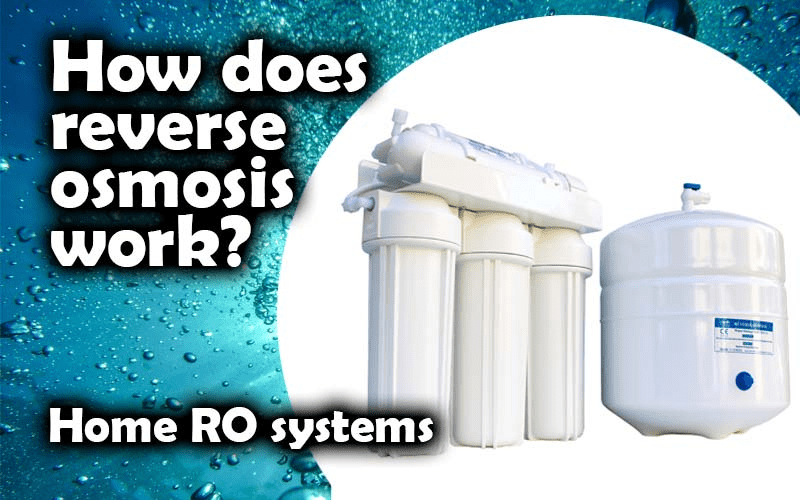
Read in our other blog post.
Filters with UV light sterilization
Countertop water filters with UV light sterilization are a great way to ensure that the water you drink and use in your home is clean, safe, and free of harmful bacteria and viruses.
These filters use a combination of mechanical and chemical filtration methods to remove impurities from your water, as well as UV light to kill any remaining microorganisms in your filtered water.
One of the biggest benefits of using a countertop filter with UV light sterilization is that it can help to protect your family from harmful microorganisms that may be present in your water supply. UV light is highly effective at killing bacteria and viruses, and it can help to ensure that your water is safe to drink and use.
Another benefit of using a countertop filter with UV light sterilization is that it can help to improve the taste and odor of your water. Many impurities in water can cause it to have a bad taste or smell, and by removing these impurities, you can enjoy clean, fresh-tasting water.
When shopping for a countertop filter with UV light sterilization, it is important to consider the specific needs of your household. For example, if you have a large family or high water usage, you may want to choose a filter with a larger capacity. Additionally, if you are concerned about removing specific impurities from your water, such as dissolved solids or lead, it may be helpful to choose a filter that is designed to remove these specific contaminants.
Filters with UV light sterilization are a great way to ensure that the water you drink and use in your home is clean, safe, and free of harmful bacteria and viruses. With so many different types and models available, it is easy to find a filter that meets your specific needs and budget.
Ceramic countertop filter
Ceramic water filters are a type of cartridge filter that use a ceramic surface with millions of tiny pores to remove impurities from water. This type of filtration is versatile and affordable, and is used in both at-home and portable filter devices.
One example of a ceramic water filter is the Zen Water 4G-MP Water Purification System.
This system features a ceramic dome replacement filter that can be used to purify water in a variety of settings. Another example is the AlexaPure Water Filtration System, which utilizes a ceramic filter cartridge that sits on top of a plastic or ceramic receptacle.
Ceramic water filters work by trapping impurities in the tiny pores of the ceramic surface. They can remove a wide range of contaminants, including bacteria, protozoa, and sediment. They are also easy to clean and maintain.
Ceramic water filters are suitable for a variety of different use cases, such as providing clean drinking water in developing countries or emergency situations, or as a way to purify tap water in developed countries.
Overall, ceramic water filters are a reliable, cost-effective solution for ensuring access to clean, safe drinking water.
Water Filter Pitchers: The Advantages of Purifying Your Drinking Water
Water filter pitchers have become a popular and affordable option for many households looking to improve the taste and quality of their drinking water. These simple devices work by running water through a filter, which removes impurities and contaminants, leaving you with clean and refreshing water to drink. But what are the main advantages of using a water filter pitcher? In this article, we’ll take a closer look at some of the key benefits of filtering your water and how a water filter pitcher can help improve the overall quality of your drinking water.
Provides Safe Drinking Water
One of the main advantages of using a water filter pitcher is that it provides safe drinking water for you and your family. According to Consumer Reports, many tap water sources contain compounds and chemicals such as zinc, chlorine, and hydrogen sulfide, which can affect the taste, smell, and safety of your water. A water filter pitcher is able to remove these impurities, providing you with clean and safe drinking water.
Improves Taste and Smell of Water
Another advantage of using a water filter pitcher is that it can improve the taste and smell of your water. Many people are put off by the taste of chlorine in their water, which can leave a strong chemical aftertaste. A water filter pitcher can remove chlorine and other impurities, leaving you with water that has a cleaner and more refreshing taste.
Cost-Effective
Water filter pitchers are also a cost-effective option for purifying your water. The annual filter costs per year range from $15 to $40, which is significantly cheaper than other water filtration options such as reverse osmosis systems.
Additionally, many water filter pitchers are designed to last for several months, which means you won’t have to replace them as often as other filters.
Convenient and Easy to Use
Water filter pitchers are also convenient and easy to use. They don’t require any special installation or plumbing, and they’re simple to fill and use. Simply pour tap water into the pitcher, and let it run through the filter. In a matter of minutes, you’ll have clean and purified water to drink.
Environmentally Friendly
Finally, water filter pitchers are also environmentally friendly. They don’t require electricity to operate, and they’re made from materials that are recyclable or biodegradable. Additionally, by using a water filter pitcher, you’ll be reducing the amount of plastic water bottles you use, which helps to reduce waste and pollution.
In conclusion, water filter pitchers are a convenient and cost-effective way to purify your drinking water. They provide safe drinking water, improve the taste and smell of water, and are easy to use. Additionally, they are environmentally friendly and help to reduce plastic waste. By using a water filter pitcher, you’ll be making a simple but meaningful change to improve the overall quality of your drinking water.
Benefits of countertop water filtration systems
- Improved water taste and odor
Countertop water filtration systems can remove impurities from the water, which improves the taste and odor of the water. - Increased Water Purity
Countertop filtration system can remove harmful contaminants from the water, ensuring that the water you drink is safe and healthy. - Convenience
They are easy to install and use, replacement filters are usually not expensive and they do not require any major plumbing changes. - Cost-effectiveness
They are a cost-effective alternative to whole-house water filtration systems.
Choosing the Right one for you
When choosing a water filter, it’s important to consider your specific needs and the types of contaminants that may be present in your water supply.
For example, if you live in an area with high levels of lead or other heavy metals in the water, a reverse osmosis filter may be the best option. If you’re looking to improve the taste of your water, an activated carbon filter may be a better choice.
Another important consideration of a countertop water filter is the filter’s flow rate and capacity.
Flow rate refers to the amount of water that can pass through the filter per minute, while capacity refers to the amount of water that can be filtered before the filter needs to be replaced.
Higher flow rates and larger capacities will typically require less frequent filter replacements and will be more convenient for larger households.
Faucet water filters
Not exactly a countertop water filter, but another type of house water filters are the faucet filters.
They provide better quality filtered water on one tap.
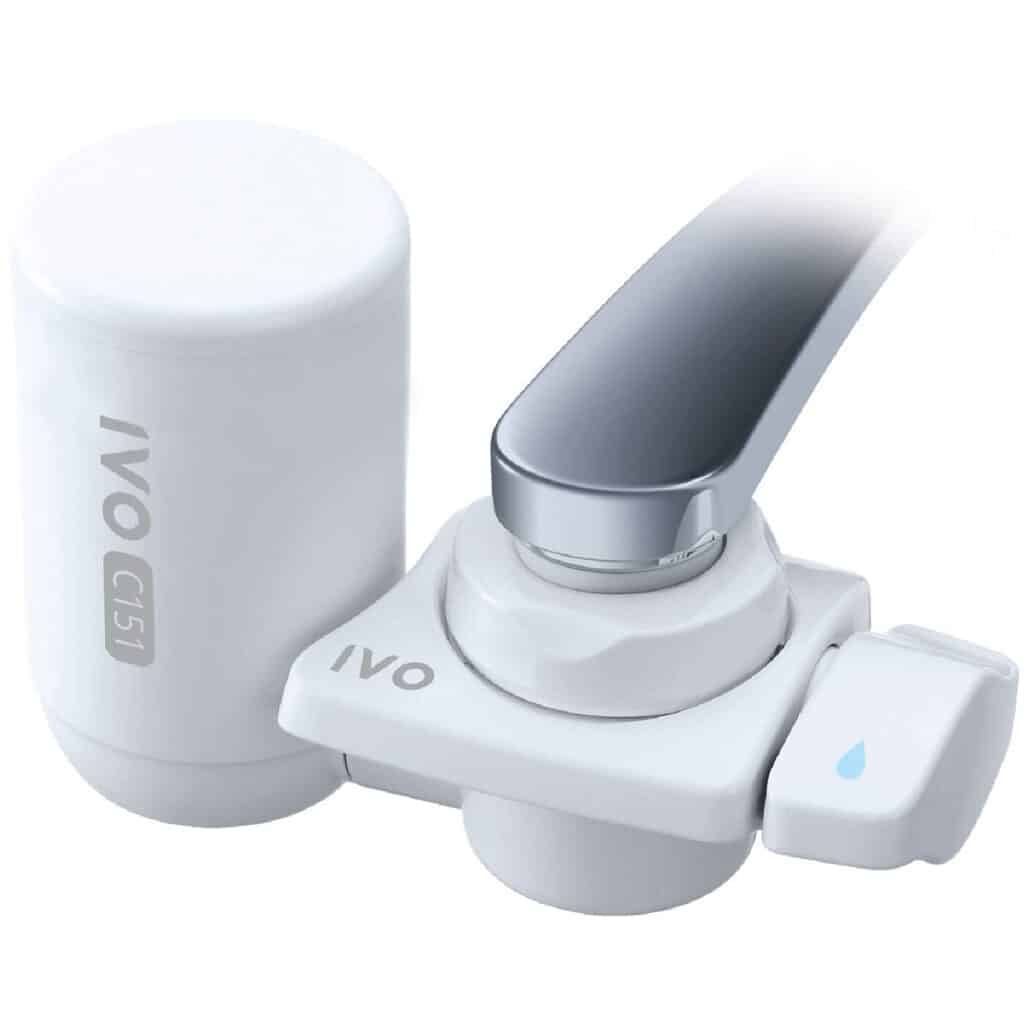
Tap water hollow fibre membrane filter
- Filters chlorine, rust, sediments, turbidity and microscopic impurities as little as 0.1 micron such as bacteria, microplastics, including sub-microplastics, all while retaining essential minerals
- Advanced 4-stage filtration process with medical-grade hollow fiber membrane
- NSF ANSI/CAN 42 standards and JIS (Japanese Industrial Standards) 3201
- This medical-grade filtration technology is capable of filtering microscopic impurities as little as 0.1 micron—that includes microplastics and even sub-microplastics!
- Manufactured by Toray Industries
- Fits most standard faucets
What to look out for?
To make the best choice of a countertop water filter for your own needs, you should take care about the following things:
- Consider the contaminants you want to remove
Different filters are designed to remove different contaminants, so it is important to choose a filter that is designed to remove the specific contaminants in your water. - Consider the flow rate
The flow rate of a filter is the amount of water it can filter per minute. Consider the size of your household and choose a filter with a flow rate that can keep up with your needs. - Consider the filter’s lifespan
Consider how often the filter needs to be replaced and the cost of replacement filters.
Countertop water filtration system advantages
Countertop water filter is a popular and convenient option to filter water from your tap.
These filters are designed to be placed on a countertop or table, and connect directly to the kitchen sink faucet. They are an easy and affordable way to improve the taste, odor, and overall quality of tap water.
One of the main advantages of a countertop water filtration system is the ease of installation.
Unlike whole-house filtration systems, which require professional installation, a countertop filter can be installed by the homeowner in just a few minutes.
This makes them a great option for renters, or for those who want to improve their water quality without making a major investment in a home filtration system.
Another advantage of countertop water filters is their versatility. These filters come in a variety of designs and styles, and can be used to remove different types of contaminants.
Some common types of countertop filters include activated carbon filters, which remove chlorine and other chemicals; ceramic filters, which remove bacteria and other microorganisms; and reverse osmosis filters, which remove a wide range of contaminants, including lead, fluoride, and arsenic.
Countertop water filters also offer a cost-effective solution for purifying tap water.
They are generally less expensive than other types of water filtration systems, and the filter cartridges typically need to be replaced only every few months.
This makes them a great option for those on a budget who still want to ensure that they have access to high-quality, filtered water.
In addition to their ease of installation, versatility, and affordability, a countertop water filter also has the advantage of being portable.
This means that it can easily be moved from one location to another, making it a great option for those who move frequently or who have multiple homes.
Overall, a countertop water filter is a convenient and effective way to purify tap water.
They are easy to install, versatile, affordable, and portable, making them a great option for a wide range of households. Whether you’re looking to improve the taste of your tap water or protect yourself and your family from harmful contaminants, a countertop water filter may be the perfect solution.
Countertop water filters disadvantages
Countertop water filters are a popular and convenient option for purifying tap water, but they also have some disadvantages to consider.
Limited capacity
These filters typically have a lower flow rate compared to other types of water filtration systems, such as under-sink or whole-house systems. This means that they may not be able to keep up with the water needs of a large household or a household with multiple users.
Additionally, countertop filters have a smaller capacity for holding contaminants, so the filter cartridges may need to be replaced more frequently.
It takes precious counter space
Another disadvantage of countertop water filters is that they can take up counter space. These filters are designed to sit on a countertop or table, which can be an issue for those with limited counter space in their kitchen.
May look not so pretty
They can also be visually unappealing, as they are not hidden from view like under-sink or whole-house filters.
Limited contaminants removal
Countertop water filters also may not remove all the contaminants present in the water.
Some countertop filters only remove certain types of contaminants, such as chlorine or bacteria.
More advanced contaminants like heavy metals, pharmaceuticals, and microplastics may not be removed by a countertop water filter.
If you live in an area with high levels of these contaminants, you may need to consider a more advanced filtration system like a reverse osmosis membrane RO filter.
They are not so effective
Another disadvantage of a countertop water filter is that they are not as effective as other filtration methods.
Some countertop filters use a physical barrier, such as a ceramic filter, to remove contaminants. But other contaminants may pass through these filters, and the effectiveness of the filter may decrease over time.
Reverse osmosis filters and other systems that use multiple stages of filtration may be more effective in removing a wider range of contaminants.
They may be expensive to maintain
Lastly, countertop water filters can be relatively expensive to maintain.
Filter cartridges need to be replaced every few months, and this can add up over time.
Additionally, some countertop filters use a separate faucet that needs to be installed, which can add to the cost of the system.
Overall, countertop water filters are a convenient and easy-to-use option for purifying tap water, but they also have some limitations.
They may not be suitable for larger households or households with multiple users, they take up counter space, they may not remove all the contaminants present in the water, they may not be as effective as other filtration methods, and they can be relatively expensive to maintain.
It’s important to weigh the advantages and disadvantages before deciding if a countertop water filter is the right choice for your home.
Conclusion
Most countertop water filters are a convenient and effective way to ensure that the water you drink is safe and healthy. Carbon filters, reverse osmosis filters, and UV filters are the most common types of countertop drinking water filters, and each has its own set of benefits.
When choosing a countertop water filtration system, consider the contaminants you want to remove, the flow rate, and the filter’s lifespan.
Water filter is a cost-effective solution compared to other types of whole house water filters and systems. With so many different types and options available, it’s easy to find a filter that meets your specific needs and budget.
With the right countertop water filter, you can have peace of mind knowing that the water you drink is clean and pure.

Who am I?
I am working as a water treatment technical manager and I have more than 25 years of practical experience in water purification.
Water purification expert
After many years of experience in water purification, I want to share some of my knowledge and get people to know the real importance of water quality.
Water purification and water treatment are very complex themes, so it is important to explain them in an easy-to-read way.
On this blog, you will find many understandable, easy-to-read information about water purification.
I hope you enjoy it, find some useful information, and thank You for reading.
More info on my work and my expertise on water purification can be found on my LinkedIn profile.

